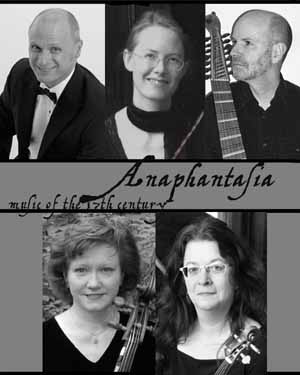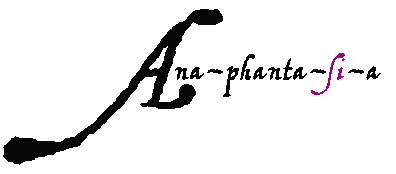
|
 Anaphantasia is named with a combination of ancient Greek words that evoke a sense of motion, power and revelation. Our aim is to celebrate mythological concepts that became musical ideals in the early 17th century.
Anaphantasia is named with a combination of ancient Greek words that evoke a sense of motion, power and revelation. Our aim is to celebrate mythological concepts that became musical ideals in the early 17th century.
Music, according to classical mythology, had magical powers and a divine origin. The word itself was a form of the term Muse - one of the nine goddesses of arts and sciences - and it represented the pursuit of truth and beauty as well as the harmony of the universe. Adopting some of these concepts, Baroque composers used specific musical devices, not to express individual sentiments, but affections, or states of the soul, with the aim of eliciting an emotional response. Affects such as rage, grandeur and grief, among others, find musical expression in dissonance, expansiveness, rhythmic irregularity, extreme contrasts, and the impassioned intensity of this music. 'But remember that song is a most powerful imitator of all things. It imitates the intentions and passions of the soul as well as words; it represents also people's physical gestures, motions, and actions as well as their characters and imitates all these and acts them out so forcibly that it immediately provokes both the singer and the audience to imitate and act out the same things.' Marsilio Ficino, De Vita Coelitus Comparanda, Florence, 1489
'. . . whether it bee a prayer, or els a dytty of gladness, of patience, of trouble, of mournynge, or of anger: the fassion of the melodye dothe so represente the meaning of the thing, that it doth wonderfullye move, stirre, pearce, and enflame the hearers myndes.' Sir Thomas More, Utopia, Louvain, 1516
'Music is the ruler of the passions of the soul.' Angelo Berardi, Ragionamenti Musicali, Bologna, 1681
'Musical Sounds do of themselves, that is to say, merely by the Sound, suggest our Ideas. Chiefly those of the Passions, as Desire, Aversion, Joy, Sorrow and the like.' John Trydell, Two Essays, Dublin, 1766
more about: |